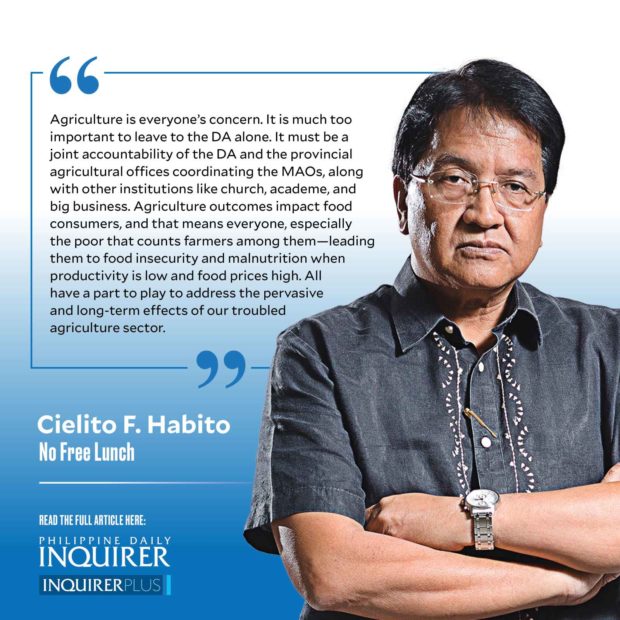‘Provincializing’ agriculture
 You know agriculture is in great trouble when so many op-ed columns are being written on the sector, even from writers who don’t normally deal on the subject. The attention is well deserved, as I consider agriculture the backbone of our economy. It stands out as the sector most evenly spread across all regions of the country, unlike services, where only two regions (Metro Manila and Calabarzon) already account for over half of the sector’s gross domestic product (GDP) contribution. In industry, only three regions do (with the addition of Central Luzon). In agriculture, it takes six regions to comprise half its output, and regional contributions are more even. One might say it’s the sector that binds them all together.
You know agriculture is in great trouble when so many op-ed columns are being written on the sector, even from writers who don’t normally deal on the subject. The attention is well deserved, as I consider agriculture the backbone of our economy. It stands out as the sector most evenly spread across all regions of the country, unlike services, where only two regions (Metro Manila and Calabarzon) already account for over half of the sector’s gross domestic product (GDP) contribution. In industry, only three regions do (with the addition of Central Luzon). In agriculture, it takes six regions to comprise half its output, and regional contributions are more even. One might say it’s the sector that binds them all together.
But agriculture directly accounts for barely a tenth of our GDP now (from about a third in the 1940s). It could, and should, account for more, especially in a country as naturally well-endowed as ours. But it’s time for a new approach to managing the sector, and it hinges on provinces taking primary responsibility to make their farmers and fishers productive, competitive, and profitable. Three observations lead me to this:
One: Devolution was a good idea, but badly executed.
After the Local Government Code of 1991 became law, municipal agricultural officers (MAOs) were largely left on their own. It seemed that the Department of Agriculture (DA) felt no compulsion to provide them technical supervision as municipal employees. Worse, mayors with little regard for agriculture made them all-around workers, even drivers. Still, the DA continued to work top-down, managing things centrally and prescribing one-size-fits-all programs, even where unsuitable. My favorite field anecdote was when I asked the village chief of a poor upland Mindanao barangay what he would ask of the government if granted one wish. His reply: carabaos (for tilling the idle grasslands around them). I asked what they were getting from government; he said fertilizers and hybrid seeds. So I asked what they did with them. He said they had no use for them, so they simply sold them. When I chided the MAO for not telling the DA of their real need, she replied, “I keep telling them that every year, but they’ve made up their minds to give fertilizers and hybrid seeds.” This incident alone firmly convinced me that recentralizing agricultural extension—like at least one DA secretary wanted—cannot be the way to go.
Two: Agriculture needs a much higher budget allocation.
Something is wrong when less than 2 percent of our total government budget goes to agriculture when our closest neighbors reportedly allot from 3.4 percent (Indonesia) to 6.5 percent (Vietnam). But it’s hard to justify raising the DA budget when its absorptive capacity is slow, and the quality of its spending is low. For example, it spends more on farm inputs (yes, fertilizers and hybrid seeds) with one-off benefits, when it should be investing more in public goods like irrigation, rural roads, and postharvest facilities with lasting productivity-enhancing effects. DA can leverage more funds for agriculture by downloading their budget to provincial governments via matching grants that give the latter one, two, or more pesos for each peso they spend on agricultural development—with necessary safeguards on fund use. This yields a double dividend of improved DA disbursements (helping them better justify increased budgets), while drawing out even more funds from the units of government closer to the actual problems on the ground, hence more knowledgeable on solving them.
Three: Agriculture is everyone’s concern.
It is much too important to leave to the DA alone. It must be a joint accountability of the DA and the provincial agricultural offices coordinating the MAOs, along with other institutions like church, academe, and big business. Agriculture outcomes impact food consumers, and that means everyone, especially the poor that counts farmers among them—leading them to food insecurity and malnutrition when productivity is low and food prices high. All have a part to play to address the pervasive and long-term effects of our troubled agriculture sector. And in our suggested playbook, provinces must step up if things are to get better.
cielito.habito@gmail.com




















